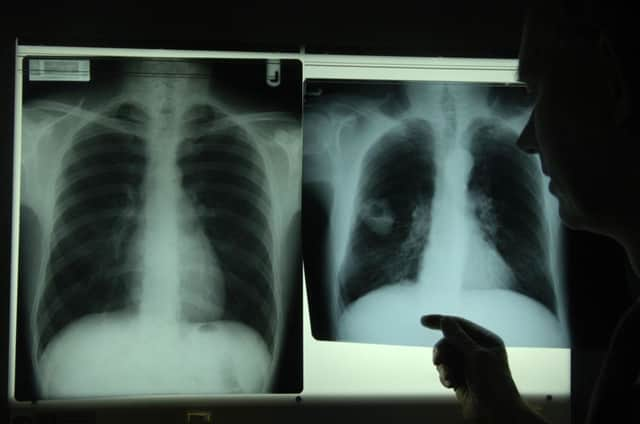‘Bad luck’ is real key to cancer, say experts


A group of leading scientists believe random mutations in DNA – which they classify as bad luck – are responsible for about two-thirds of cancers, although they say unhealthy habits such as smoking help increase the risk.
The remaining third of cancer cases are linked to environmental factors or defective inherited genes, according to the team’s findings.
Advertisement
Hide AdAdvertisement
Hide AdThe research, which was carried out by staff at Johns Hopkins University School of Medicine in the United States, said “unlucky” mutations accounted for 22 out of 31 cancer types they studied.
Researchers analysed published data on the number of divisions of stem cells in 31 different tissues found in humans. The results were compared with the incidence of cancer in the same tissues. A strong correlation was found between a particular tissue’s stem cell division rate and its likelihood of developing cancer.
The team found that the more often cells divided, the more likely it was that “letters” of their genetic code would become jumbled, leading to an increased risk of cancer. Overall, the study found that random mutations due to stem cell division could explain about 65 per cent of cancer cases.
Professor Bert Vogelstein, who led the research, said: “All cancers are caused by a combination of bad luck, the environment and heredity, and we’ve created a model that may help quantify how much of these three factors contribute to cancer development.
CONNECT WITH THE SCOTSMAN
• Subscribe to our daily newsletter (requires registration) and get the latest news, sport and business headlines delivered to your inbox every morning
“The best way to eradicate these cancers will be through early detection, when they are still curable by surgery.”
Scientists have known for more than a century that some tissue types give rise to cancer millions of times more often than others, but why this should be so has not been clear. The new evidence, published in the journal Science, suggests that the answer lies chiefly in the number of times a tissue’s stem cells divide and replicate their DNA.
“Bad luck” mutations – those that occur when one chemical letter in DNA is wrongly swapped for another during cell replication – largely explained 22 of the 31 cancer types studied. The remaining nine had incidence rates higher than predicted by bad luck, which were presumed to be due to environmental or inherited factors.
Advertisement
Hide AdAdvertisement
Hide AdProf Vogelstein said: “We found that the types of cancer that had higher risk than predicted by the number of stem cell divisions were precisely the ones you’d expect, including lung cancer, which is linked to smoking; skin cancer, linked to sun exposure; and forms of cancers associated with hereditary syndromes.”
People who live a long life despite exposure to cancer-causing agents such as tobacco are not so much blessed with “good genes” as good luck, the professor said.
He pointed out human colon, or large intestine, tissue underwent four times more stem cell divisions than small intestine tissue, and colon cancer was much more prevalent than small intestine cancer.
Dr Cristian Tomasetti, co-author of the study, said: “If two-thirds of cancer incidence across tissues is explained by random DNA mutations that occur when stem cells divide, then changing our lifestyle and habits will be a huge help in preventing certain cancers, but this may not be as effective for a variety of others.
“We should focus more resources on finding ways to detect such cancers at early, curable stages.”
However, experts from charity Cancer Research UK said they believed many cancers could be prevented by lifestyle changes.
Dr Emma Smith, senior science information officer at Cancer Research UK, said: “We estimate that more than four in ten cancers could be prevented by lifestyle changes, like not smoking, keeping a healthy weight, eating a healthy diet and cutting back on alcohol. Making these changes is not a guarantee against cancer, but it stacks the odds in our favour.”
Some 30,000 Scots develop cancer every year, with the number expected to rise to almost 35,000 by 2020 due to the ageing population.
Advertisement
Hide AdAdvertisement
Hide AdIn the UK, the most common cancers in woman are breast, lung and bowel. In men, they are prostate, lung and bowel.
The past decade has seen an overall fall in the number of people dying from the disease.
SCOTSMAN TABLET AND IPHONE APPS